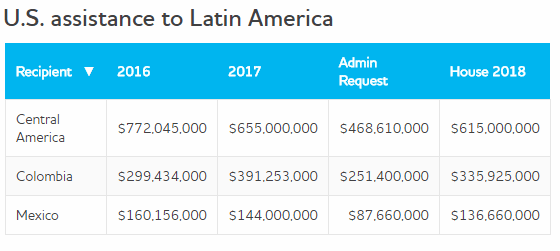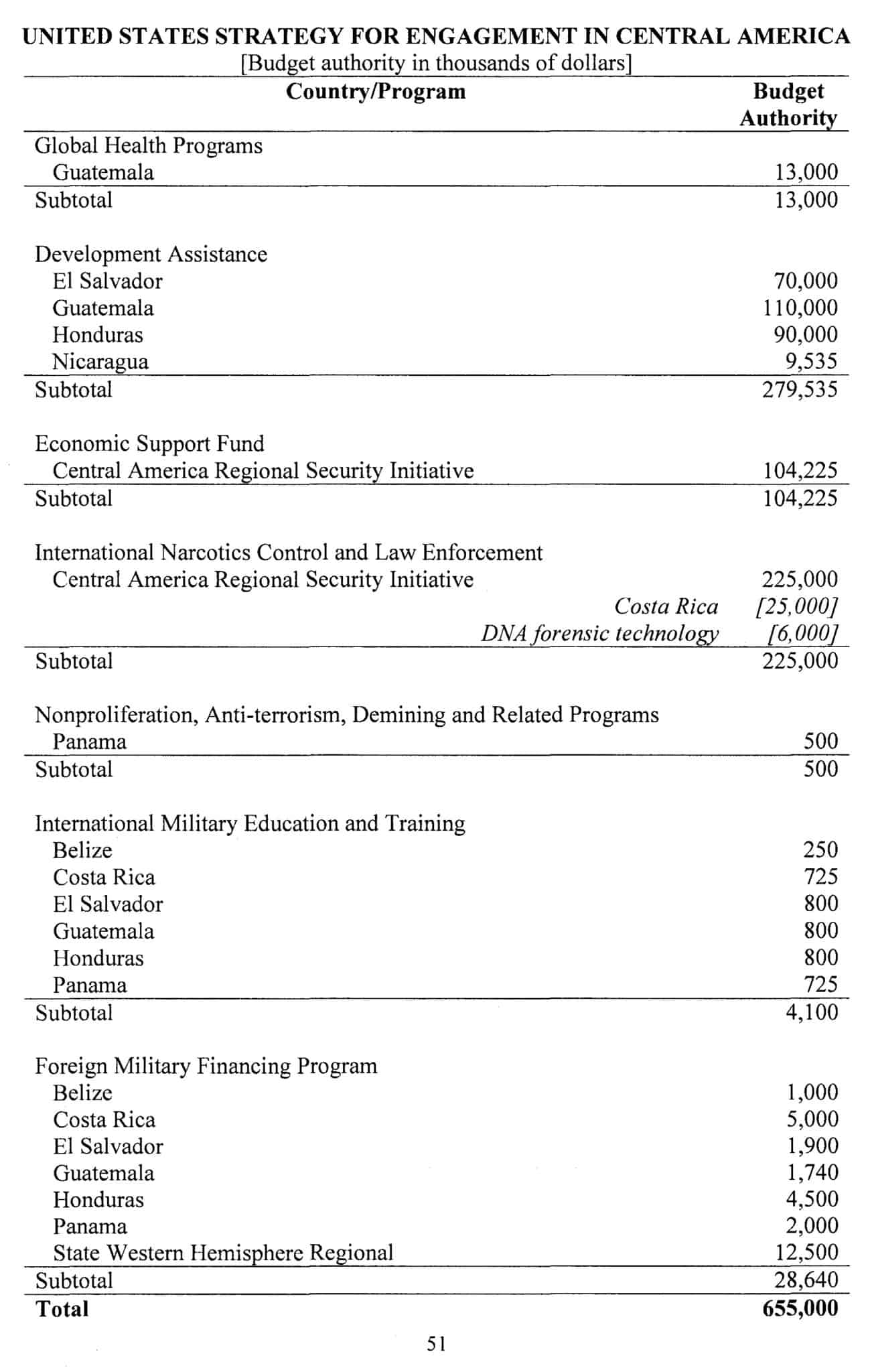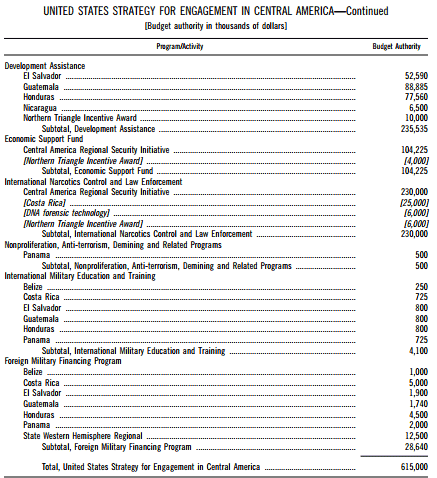On July 19 the House Appropriations Committee “marked up” (amended and approved) the legislation that will fund U.S. assistance to Latin America and the world in 2018. The State and Foreign Operations bill cuts aid to the hemisphere from 2017 levels. However, it restores much of the far deeper cuts that the Trump administration called for in its May budget request.
- Text of the bill
- Text of the Appropriations Committee’s narrative report, which includes more detail
The aid bill has a long way to go. The full House of Representatives must consider and approve it. The Senate Appropriations Committee must come up with a draft, which then goes before the full Senate. And then both houses’ versions must be reconciled and approved. This is all supposed to happen before Fiscal Year 2018 begins on October 1, but this deadline often slips.
At a glance, these are the topline numbers:
The bill does not specify aid outlays for every country in the region, but it does recommend levels for Central America, Mexico and Colombia.
Central America
2016: $772,045,000
2017: $655,000,000
Administration request: $468,610,000
What the House wants: $615,000,000
The House bill would cut assistance to Central America by $40 million — all of which would come from the Development Assistance account, through which $279.5 million was funneled to the region in 2017. Development Assistance supports violence-prevention efforts, job-creation programs, and other non-security related programs mostly administered by USAID. For 2018, the House supports $235 million through this account, a $50 million reduction in funds to the Northern Triangle.
As the below tables show, this bill maintains funding levels for security assistance through the Foreign Military Financing (FMF), International Military Education and Training (IMET), Nonproliferation, Anti-terrorism, Demining and Related Programs (NADR), and International Narcotics Control and Law Enforcement (INCLE) programs. It also keeps funding for Attorneys General from El Salvador, Honduras, and Guatemala, for the International Commission Against Impunity in Guatemala (CICIG), and the Mission to Support the Fight Against Corruption and Impunity in Honduras (MACCIH).
House appropriators kept conditions attached to Central America assistance, putting a hold on at least half of funds until the Secretary of State certifies that countries are taking steps to improve accountability, transparency, justice systems, and security practices, among others. This year, the Committee went a step further and included $20 million for an “Incentive Award” program, which would be given to the single Northern Triangle country that has made the most progress on two or more of the conditions.
Here is a comparison between 2017 aid numbers and the 2018 House appropriations bill:
Colombia
2016: $299,434,000
2017: $391,253,000
Administration request: $251,400,000
What the House wants: $335,925,000
The bill would cut aid to post-conflict Colombia by a little over $55 million. All of the cut would come from the Economic Support Fund, which ESF pays for increased civilian government presence in rural zones of Colombia, crop substitution programs in coca-growing zones, assistance to conflict victims, human rights, and support for Afro-Colombian and indigenous communities. The Trump administration had proposed zeroing out Foreign Military Financing (FMF), but the House restored it to 2017 levels. FMF goes to Colombian military “engineering” units that carry out construction projects in poorly governed rural areas, focusing on roads, police stations, and military bases.
The bill freezes 30 percent of INCLE and ESF aid, or nearly $83 million, and would release this money only if Colombia reduces coca and cocaine production in 2017. As written, this condition does not take into account whether Colombia is making a good-faith effort to reduce its large current coca crop. If Colombia’s current efforts under chapter 4 of the FARC peace accord do not yield immediate results, the House bill would slash assistance deeply:
Security aid to Colombia usually comes with human rights conditions. These hold up a portion of assistance until the Secretary of State certifies that Colombia is making progress on investigating and punishing human rights abuse, among other measures. As has been the case in recent years, the House version of the bill does not hold up any aid, it just requires a report on Colombia’s progress. The Senate has usually restored the language tying the conditions to a partial hold on aid.
Mexico
2016: $160,156,000
2017: $144,000,000 (est.)
Administration request: $87,660,000
What the House wants: $136,660,000
Aid to Mexico would continue a slow decline from the 2008-2011 peak of the “Mérida Initiative” aid package. The House bill, though, contemplates a decline far less steep than the 39 percent cut that the White House requested. Hundreds of millions of dollars of past years’ aid to Mexico remain allocated, but undelivered.
The House Committee report urges the State Department “to continue to support efforts to secure Mexico’s borders and encourages a continued focus on Mexico’s southern border with Guatemala and Belize.”
Inter-American Foundation
2016: $22,500,000*
2017: $22,500,000
Administration request: $4,565,000
What the House wants: $11,250,000
* (Omnibus report language included an additional $15 million transfer to the Foundation from the Development Assistance account.)
A small agency separate from USAID, the Inter-American Foundation pursues a “grassroots development” model focused on marginalized communities. The Trump administration’s request proposed to close the Foundation down after nearly 40 years of operations (the $4.565 million proposal would have covered shutdown costs). Instead of an outright shutdown, House appropriators would cut the agency severely.







